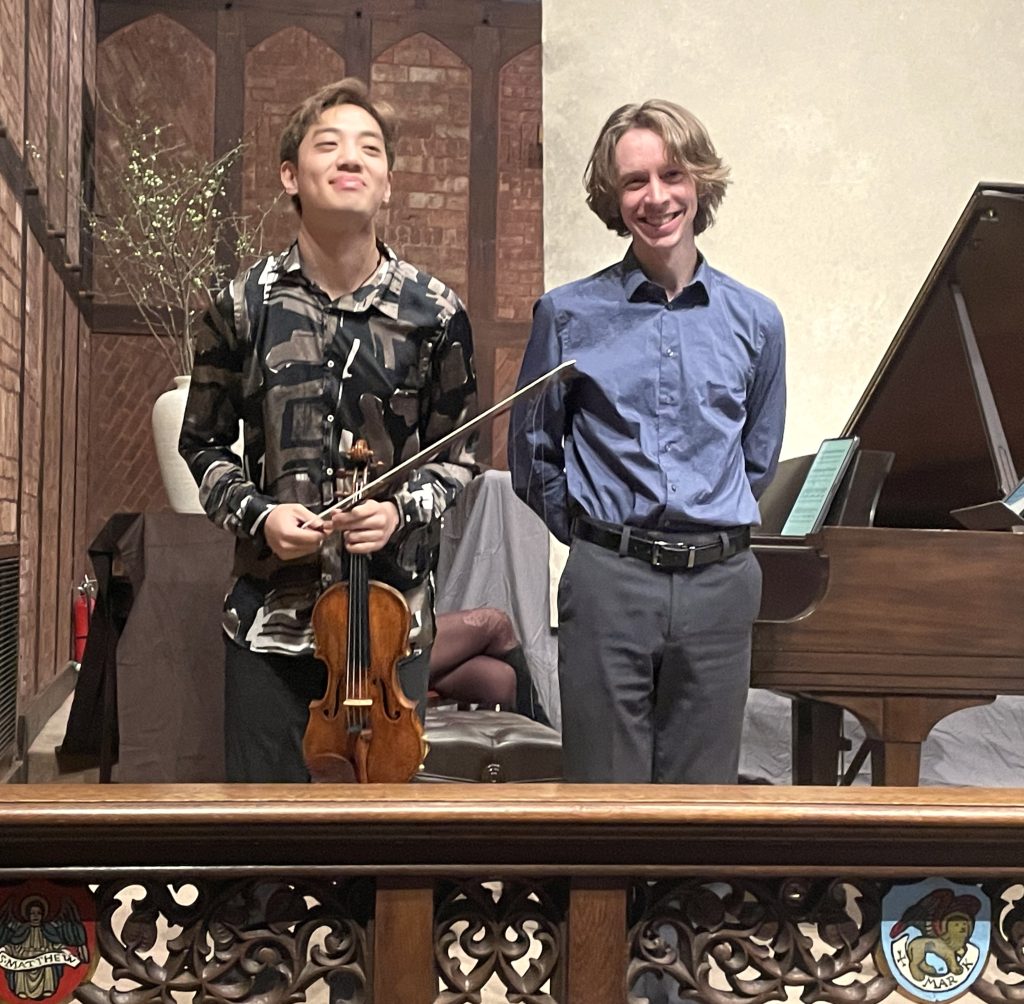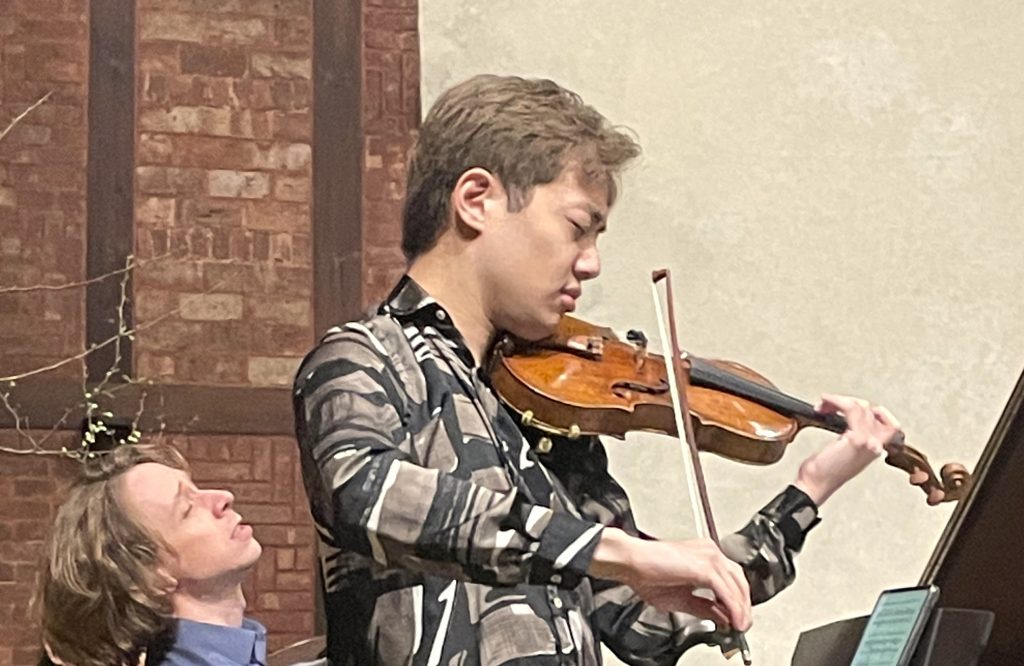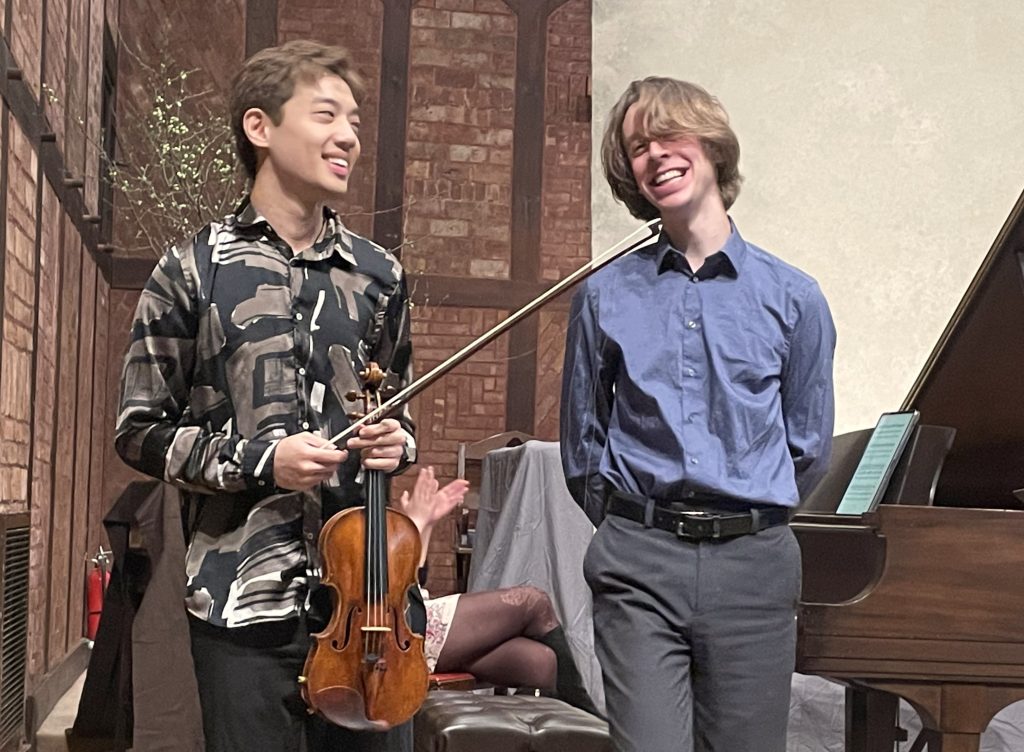
by Kevin T McEneaney
Violinist Leonard Fu and pianist Baron Fenwick provided the second concert at Grace Church in the newly formed Millbrook Music Salon series. Introduced by Artistic Director Sophia Zhou, Fu, has shared the stage with Mitsuko Uchida and Kim Kashkashian. He won the First Prize at the Schadt international competition. He performs on the Lorenzo Storini, Cremona, 1781, violin on loan from a German fund. Leonard has an astonishing range of composers in the traveling trunk of his mind.
Pianist Baron Fenwick attends Juilliard School and is working on his doctorate. His debut CD with Naxos is currently in production. Baron has collaborated with Caroline Shaw and Julia Wolfe. His hands have long, thin fingers that command the keyboard.
They opened with the first movement of Edward Elgar’s Violin Sonata in E Minor, op 82 (1918). When Elgar sat down to write this late work, he had been blocked from composing for two years, and then this work arrived in a storm of energy, being completed in twenty-six days. The Allegro opening is bold and almost intoxicating with a fierce, confident Romantic style. The resolute opening is vigorous, and the audience immediately knew they heard a most accomplished violinist with rising and falling notes that gave ground to a rocking repetition, then arrived at an after-storm calm before hinting at the violin sonatas of Brahms with more subtle chromaticism than Brahms ever dared. On piano, Baron Fenwick provided both lyric backing and elegant rhythm.

Leonard, who turns 28 this month, performed his composition, Romance (2021). This work sounded autobiographical: the story of a tender love affair that eventually came to naught, yet remained a beloved memory. I fell in love with this lyrical outburst and preferred it to the excellent Elgar composition, perhaps mainly because it was simultaneously romantic with a post-modern edge, the piano whispering counterpoint. Next, he performed his composition Abschiedsempfindung which translates as “Farewell sensation.” This was another autobiographical work that describes his happiness at becoming the violin concertmaster in the form of a waltz at the Kammerphilharmonie in Bremen. The arc of the work records his delight at various moments in this job, then rises to an angry, explosive conversation which leads to a parting of ways as he departed from the post.
Suite for Violin and Piano, Op. 6 (1935)by Benjamin Britten (1913-1976) offered Baron Fenwick a larger role. They performed the fourth movement Waltz. This work is not often performed due to the unusual mixing of tonal and atonal with post-tonal elements as if they were distinct figures in the same neighborhood that offered varied satiric descriptions of personalities and at one point pizzicato as if someone was delivering a boring repetitive lecture to an audience, or perhaps a trite sermon.
Violin Sonata No. 2 in G Major, M 77 (1927) by Maurice Ravel (1875-1937) offered a lively and eccentric outing. The opening Allegretto declared lyric angst. Blues struggled to evoke the burden of racial discrimination in America in a rather funky way, then ended with a short satiric Moderato that limed the insensitivity of the wealthy ruling class. Baron’s blues riffs were exceptionally effective, claring that nothing seemed to change in America, implying a current political, allegorical resonance in contemporary politics. Here Fenwick excelled in this funky pageant.
For the Finale they played Nocturne and Tarantella, Op. 28 (1915) by Polish composer Karol Szymanowski (1882-1937). The Nocturne described an appealing landscape in Morocco, ending with the motif of the evening with a lyric call of a muezzin for people to retire to bed, followed by a dervish tarantella. That musical tradition was carried by gypsies from the rugged Caucasus mountains to Sicily where they migrated, and that style of music became quite popular in Italy. This hearty folk conclusion offered convivial sentiment for all to depart with a smile and perhaps a happy strut in their footwork or cranium.
This was a delightful and intimate concert by two young rising stars….
